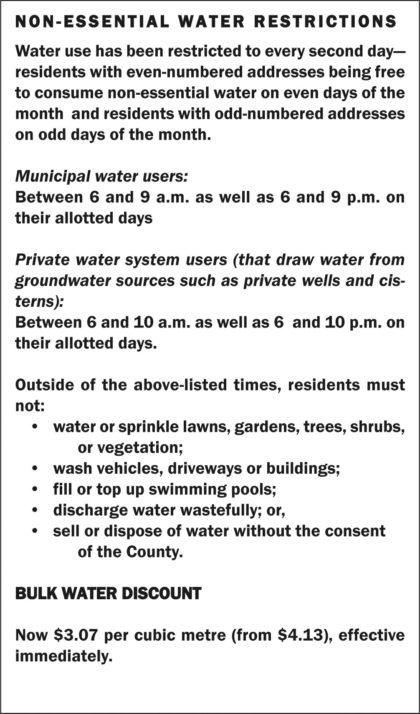County News
Relief and restrictions

Council responds to drought conditions
It has been a hot, dry summer. So dry that Quinte Conservation recently declared a Level 3 condition, its most severe rating, for much of the region— including all of Prince Edward County. A Level 3 condition indicates a failure of the water supply to meet demand. Creeks have dried up. Groundwater is low—at levels typical in late fall. Crops are stunted and withering. Vines are dropping grapes. Lawns are brown and crispy. Meanwhile, some trees are shedding leaves and withering under the heat and lack of water.
 So it was that council met during in a special meeting last week—to consider several steps to ease the hardship for some and restrict others from abusing the dwindling water supply. It must first be noted that this summer’s drought— though severe—is not yet unprecedented. This July was only the third driest since 1986, according to Christine Lafleur of Quinte Conservation. Both 1989 and 2001 saw dryer months of July. Groundwater levels, too, have been lower in past years—but never as early as this year.
So it was that council met during in a special meeting last week—to consider several steps to ease the hardship for some and restrict others from abusing the dwindling water supply. It must first be noted that this summer’s drought— though severe—is not yet unprecedented. This July was only the third driest since 1986, according to Christine Lafleur of Quinte Conservation. Both 1989 and 2001 saw dryer months of July. Groundwater levels, too, have been lower in past years—but never as early as this year.
It is too soon to call it a once-in-a-hundred- year event, but neither Quinte Conservation nor Shire Hall were willing to wait to find out.
So council gathered last week to consider two types of responses—one, a discount on bulk water and two, a set of temporary water usage restrictions and tools to protect the County’s water systems.
It quickly agreed to extend a 25-per-cent discount on bulk water—from $4.13 per cubic metre, to $3.07. The discount will not be funded by water system consumers, but rather by the general taxpayer through the tax rate stabilization reserve fund.
New restrictions prompted a harder and more complicated debate. No one doubted the hardship created by the lack of rainfall this summer—nor the need for additional measures to restrict water use. But deciding who would be restricted and how the new rules would be enforced proved more complicated.
Ever lamenting the good old days, Councillor Kevin Gale said the restrictions felt like watered-down communism, but he would support them in any event.
“If we lived in a world where common sense prevailed, like it used to, we wouldn’t need to do this,” said Gale. “But we don’t live in that world anymore.”
Bloomfield councillor Barry Turpin worried about enforcement of the new bylaw. Works commissioner Robert McAuley had explained that enforcement would be complaintdriven, relying on neighbours to notify bylaw officials about residents watering lawns and washing cars outside the permitted times.
“It’s a slippery slope to give everybody a ticket book,” said Turpin.
He urged Shire Hall officials and his council colleagues to do more to educate rather than prosecute.
McAuley assured council that this was the intention— that the first encounter between a bylaw enforcement official and a resident would be to explain the rules, the conditions and why the restrictions are in place.
“We are not in this to become water police,” said McAuley. “But we need people to understand that it is one bucket of water. While you may still have water—your water use may be impacting your neighbour.”
Included in the recommendations to council was a proposal to grant special powers to the Chief Administrative Officer to enact further restrictions on water use—without requiring council consent.
John Thompson is chair of the Low Water Response Team that recommended declaring a Level 3 water condition. Yet he was leery of giving Shire Hall staff unfettered means to restrict water use in the County.
“This seems too draconian,” said Thompson. “It needs public input. These additional measures are required immediately. We have the time to get this right.”
McAuley countered that if circumstances worsened, he may need to act quickly to protect the Picton water supply and other systems.
Councillor Bill Roberts was the only representative to take heed of Thompson’s caution. Roberts said he tends to favour delegating more decision-making authority to staff—but this isn’t one of those circumstances.
“Council has an accountability issue here,” said Roberts. “It’s unfair for the CAO to shoulder this added responsibility.”
McAuley acknowledged this was new territory but that it may be necessary.
Council was in crisis response mode and most weren’t willing to put restrictions on staff’s ability to respond.
That is, except for Roblin Lake in Ameliasburgh.
Fifty-seven Ameliasburgh municipal water customers share Roblin Lake with other nearby residents and farms desperate for water. Both Mark Boone from Quinte Conservation and McAuley explained that the water level is low and the municipal water system is at risk.
Among the new restrictions, farmers will be banned from taking water from Roblin Lake for their animals.
Councillor Dianne O’Brien felt this was too great a hardship for these farmers.“Farmers use this water to survive,” pleaded O’Brien.
McAuley was sympathetic but unbending.
“A bulk water taker is a bulk water taker,” said McAuley. “Our municipal water system is at risk. These residents rely on this water to drink, farmers can go elsewhere.”
Still, O’Brien pressed on—seeking to amend the rules to exempt Ameliasburgh-area farmers.
Other councillors noted that farmers from all regions of the County were being compelled to buy bulk water from Picton.
“I won’t jeopardize Ameliasburgh water users,” said Kevin Gale.
McAuley put a finer point on his objection. He explained that provincial legislation compels him to secure the safety of the Ameliasburgh water supply under the Source Water Protection Plan of the Clean Water Act.
“We have a responsibility to protect this water supply,” said McAuley, coolly. “I will take whatever action I need to take to do this.”
O’Brien’s exemption failed.
Council approved the new restrictions and granted new authority to the CAO to tighten them further. Neither Quinte Conservation nor Shire Hall officials offered evidence, or even assurance, that enacting all these restrictions would make a difference if the drought continues.
But by late last week, they and council felt they had to do something. McAuley said the restrictions enacted last week will be lifted when the region’s water conditions are no longer considered Level 3.

My other request at the meeting was that the local farmers be allowed to draw their needed water for livestock’s needs, and essential use, from Roblin Lake. According to the Ontario Water Resources Act, the County does not have the authority to restrict water access for the watering of livestock. Quinte Conservation through the Low Water Response Team requested restrictive measures on non-essential uses only. As the rural bylaw was approved, the farmers attended the next Council meeting as their first opportunity to speak about how this attempt prohibition would impact their livelihood and their legal requirements to provide an adequate supply and quality of water to meet Federal and Provincial laws and regulations for animal care and food safety and were not allowed to speak as the two thirds vote fell short by one.
The Prince Edward Federation of Agriculture also brought new information to the table such as the amount of water needed for the livestock and the calculation that this would translate into 0.53 millimeters per week but this to was not allowed to be presented.
If the Lake level was a major concern who would have thought that lawn watering from the Lake would be allowed for up to 8 hours on alternate days!